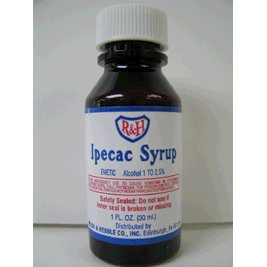Syrup of ipecac may soon be thrown out from the medicine cabinet. In the past, ipecac was a household staple commonly used to induce vomiting in victims of poisoning. But recently, the American Academy of Paediatrics no longer recommends the use of syrup of ipecac for first aid of accidental poisoning at home.
Clinical experience shows that the sooner ipecac is taken after an accidental poisoning; the greater 
Syrup of ipecac can also cause diarrhoea and lethargy. These symptoms, particularly lethargy, can make diagnosis and monitoring even more difficult as they can mimic the adverse effects of the ingested poison. Moreover, when ipecac is readily available in the medicine cabinet or first aid kit, improper use is very likely. It can be taken even when not necessary.
Syrup of ipecac was originally recommended as home remedy for accidental poisoning especially in people at risk of symptoms worse than vomiting but not at risk of severe symptoms requiring emergency care. But the results of a recent study have led to the debunking of this idea. The study that gathered data from several poison centers in the US revealed that use of ipecac does not actually reduce the number of hospital visits. Moreover, the study further showed that children who were given ipecac after accidental poisoning did not fare better than those who were not given ipecac. While this does not conclusively say that ipecac is not effective, its limited benefit does not justify its position as the primary first aid remedy for poisoning at home.
Health experts want to give credence on prevention as the primary method of steering clear of poisoning hazards. There are a number of things you can to minimize the risk of accidental poisoning at home:
- Keep poison out of children’s sight and reach.
- Store potential poisons properly in child-resistant containers.
- Keep hazardous chemicals in their original containers or properly labeled.
- Do not store hazardous substances in empty food containers.
- Dispose unused medications properly.
- Never describe medications as candy.
- Avoid taking medications in front of children.
In case of accidental poisoning at home, be sure to call the local poison control center. Keep a number of the local poison control near the telephone. You can also call 911 for severe poisoning or if the victim is unconscious and requires immediate medical assistance.
Learn More
To learn more about how to manage victims with signs of poisoning enrol in workplace approved first aid training (enrol here). Standard first aid and standard childcare first aid programs involve poisonings within the curriculum.
Related Video
http://www.youtube.com/watch?v=-lzEya4AM_4
